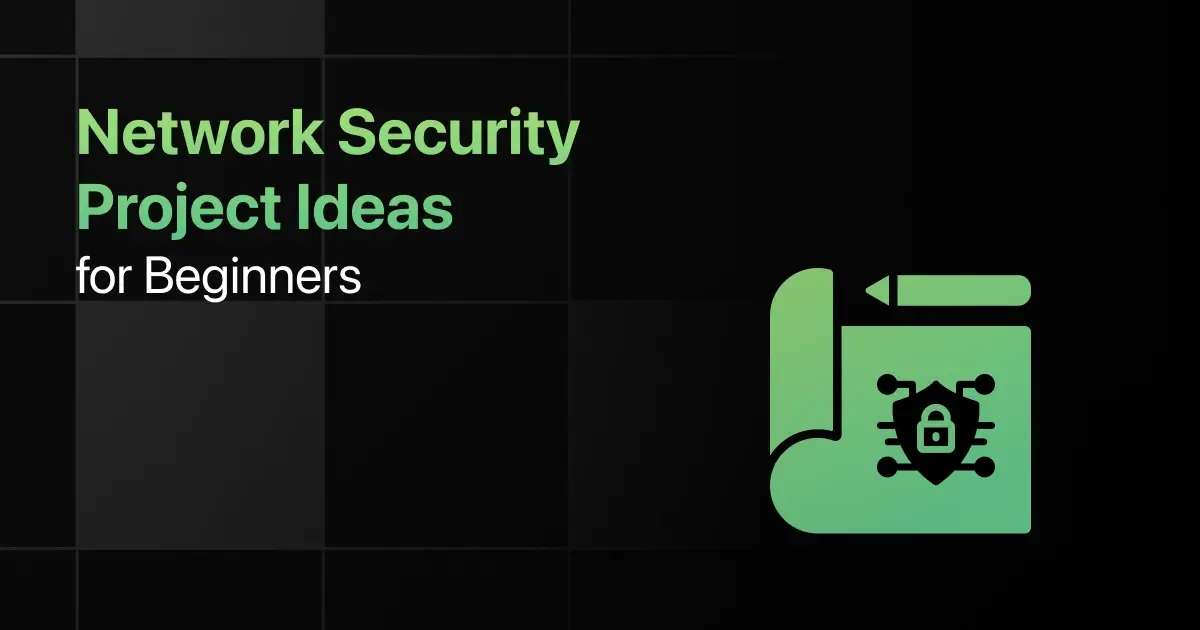Best Network Security Project Ideas for Beginners

Are you interested in practically mastering network security? Then you are in the right place.
But there is a huge crowd looking to master this! To stand out among them you need to create a strong portfolio.
You can start creating your unique portfolio by beginning with the below-mentioned network security projects for beginners.
10 Beginner-Friendly Network Security Project Ideas – Overview
Here’s an overview of the 10 best network security projects for beginners:
| S.No. | Project Title | Complexity | Estimated Time | Source Code |
|---|---|---|---|---|
| 1 | Password Cracking | Easy | 3 hours | View Code |
| 2 | Network Scanning | Easy | 4 hours | View Code |
| 3 | Wi-Fi Security Testing | Easy | 5 hours | View Code |
| 4 | Vulnerability Assessment | Easy | 6 hours | View Code |
| 5 | Phishing Simulation | Easy | 6 hours | View Code |
| 6 | Web Application Testing | Medium | 6 hours | View Code |
| 7 | Metasploit Basics | Medium | 7 hours | View Code |
| 8 | Password Policy Analysis | Easy | 7 hours | View Code |
| 9 | Malware Analysis | Medium | 8 hours | View Code |
| 10 | File Encryption and Decryption | Medium | 8 hours | View Code |
Top 10 Network Security Projects for Beginners
Below are the top 10 simple network security projects for beginners:
1. Password Cracking
This project involves using tools to crack passwords. You will learn about password vulnerabilities and cracking techniques.
Duration: 3 hours
Project Complexity: Easy
Learning Outcome: Understanding of password vulnerabilities
Portfolio Worthiness: Yes
Required Pre-requisites:
- Basic knowledge of command-line tools
- Understanding of password structures
- Familiarity with Linux/Windows OS
Resources Required:
- John the Ripper tool
- Wordlist files
- Test system for practice
Real-World Application:
- Assessing the strength of passwords
- Improving password policies
2. Network Scanning
This project involves using Nmap to scan networks and identify open ports and services. You will learn about network scanning and mapping.
Duration: 4 hours
Project Complexity: Easy
Learning Outcome: Understanding of network scanning techniques
Portfolio Worthiness: Yes
Required Pre-requisites:
- Basic networking concepts
- Familiarity with the Nmap tool
- Knowledge of IP addressing
Resources Required:
- Nmap tool
- Target network or virtual lab
- Network documentation
Real-World Application:
- Network security assessments
- Identifying vulnerable services
3. Wi-Fi Security Testing
This project involves testing Wi-Fi networks for security vulnerabilities using tools like Aircrack-ng. You will learn about Wi-Fi security and penetration testing.
Duration: 5 hours
Project Complexity: Easy
Learning Outcome: Understanding of Wi-Fi security vulnerabilities
Portfolio Worthiness: Yes
Required Pre-requisites:
- Basic understanding of Wi-Fi networks
- Familiarity with Aircrack-ng suite
- Knowledge of network security principles
Resources Required:
- Aircrack-ng tool
- Test Wi-Fi network
- Wireless network adapter
Real-World Application:
- Securing Wi-Fi networks
- Identifying and mitigating Wi-Fi vulnerabilities
4. Vulnerability Assessment
This project involves performing vulnerability scans on websites using tools like OpenVAS. You will learn about identifying and assessing vulnerabilities.
Duration: 6 hours
Project Complexity: Easy
Learning Outcome: Understanding of vulnerability assessment techniques
Portfolio Worthiness: Yes
Required Pre-requisites:
- Basic web security concepts
- Familiarity with the OpenVAS tool
- Understanding of network protocols
Resources Required:
- OpenVAS tool
- Target website or web application
- Vulnerability databases
Real-World Application:
- Identifying security flaws in websites
- Improving web application security
5. Phishing Simulation
This project involves creating a simulated phishing attack to understand social engineering tactics. You will learn about phishing techniques and prevention.
Duration: 6 hours
Project Complexity: Easy
Learning Outcome: Understanding of phishing and social engineering
Portfolio Worthiness: Yes
Required Pre-requisites:
- Basic knowledge of email systems
- Understanding of social engineering principles
- Familiarity with phishing prevention techniques
Resources Required:
- Phishing simulation tool
- Email accounts for testing
- Test subjects (colleagues or friends)
Real-World Application:
- Educating users about phishing threats
- Implementing phishing prevention measures
6. Web Application Testing
This project involves using tools like OWASP ZAP to test web applications for common vulnerabilities. You will learn about web application security testing.
Duration: 6 hours
Project Complexity: Medium
Learning Outcome: Understanding of web application vulnerabilities
Portfolio Worthiness: Yes
Required Pre-requisites:
- Basic web development knowledge
- Familiarity with OWASP ZAP tool
- Understanding of web security principles
Resources Required:
- OWASP ZAP tool
- Target web application
- Web security guides
Real-World Application:
- Identifying and fixing web application vulnerabilities
- Enhancing web application security
7. Metasploit Basics
This project involves learning to use Metasploit Framework to exploit known vulnerabilities.
You will learn about exploitation techniques and vulnerability management.
Duration: 7 hours
Project Complexity: Medium
Learning Outcome: Understanding of exploitation and vulnerability management
Portfolio Worthiness: Yes
Required Pre-requisites:
- Basic knowledge of network security
- Familiarity with Metasploit Framework
- Understanding of penetration testing concepts
Resources Required:
- Metasploit Framework
- Target system or virtual lab
- Vulnerability databases
Real-World Application:
- Exploiting known vulnerabilities
- Conducting penetration tests
8. Password Policy Analysis
This project involves analyzing and improving the password policies of a system. You will learn about password security and policy enforcement.
Duration: 7 hours
Project Complexity: Easy
Learning Outcome: Understanding of password policy best practices
Portfolio Worthiness: Yes
Required Pre-requisites:
- Basic knowledge of system administration
- Understanding of password security principles
- Familiarity with policy enforcement tools
Resources Required:
- Policy analysis tools
- Test system
- Security guidelines
Real-World Application:
- Improving organizational password policies
- Enhancing system security
9. Malware Analysis
This project involves studying and analyzing basic malware samples in a safe, isolated environment. You will learn about malware behavior and analysis techniques.
Duration: 8 hours
Project Complexity: Medium
Learning Outcome: Understanding of malware analysis techniques
Portfolio Worthiness: Yes
Required Pre-requisites:
- Basic knowledge of operating systems
- Understanding of malware types
- Familiarity with analysis tools
Resources Required:
- Malware samples
- Isolated virtual machine
- Analysis tools
Real-World Application:
- Identifying and analyzing malware threats
- Implementing malware defense strategies
10. File Encryption and Decryption
This project involves learning and implementing file encryption techniques to protect sensitive data. You will learn about encryption methods and data security.
Duration: 8 hours
Project Complexity: Medium
Learning Outcome: Understanding of encryption and decryption techniques
Portfolio Worthiness: Yes
Required Pre-requisites:
- Basic knowledge of cryptography
- Familiarity with encryption tools
- Understanding of data security principles
Resources Required:
- Encryption software
- Test files
- Security documentation
Real-World Application:
- Protecting sensitive data
- Implementing encryption solutions
Frequently Asked Questions
1. What are some easy network security project ideas for beginners?
Some network security project ideas for beginners are password cracking, network scanning, and vulnerability assessment.
2. Why are network security projects important for beginners?
Network security projects are important for beginners as they provide hands-on experience and practical knowledge in cybersecurity.
3. What skills can beginners learn from network security projects?
From network security projects, beginners can learn cybersecurity, penetration testing, and risk management.
4. Which network security project is recommended for someone with no prior programming experience?
A simple password-cracking project is recommended for someone with no prior programming experience.
5. How long does it typically take to complete a beginner-level network security project?
It typically takes 8 hours to complete a beginner-level network security project.
Final Words
Network security mini-projects for beginners can help you build a strong portfolio to ace cyber security and ethical hacking interviews.
Based on your experience and understanding of these network security mini-projects for beginners, you can develop them to suit your requirements.
Explore More Computer Network Resources
Explore More Project Ideas
- Python
- Java
- C Programming
- HTML and CSS
- React
- JavaScript
- PHP
- C++
- DBMS
- SQL
- Excel
- Angular
- Node JS
- DSA
- Django
- Power BI
- R Programming
- Operating System
- MongoDB
- React Native
- Golang
- Matlab
- Tableau
- .Net
- Bootstrap
- C#
- Next JS
- Kotlin
- jQuery
- React Redux
- Rust
- Shell Scripting
- Vue JS
- TypeScript
- Swift
- Perl
- Scala
- Figma
- RPA
- UI/UX
- Automation Testing
- Blockchain
- Cloud Computing
- DevOps
- Selenium
- Internet of Things
- Web Development
- Data Science
- Android
- Data Analytics
- Front-End
- Back End
- MERN Stack
- Big Data
- Data Engineering
- Full Stack
- MEAN Stack
- Artificial Intelligence
- Machine Learning
- Arduino
- Cyber Security
- Raspberry Pi
- Spring Boot
- NLP
- Embedded Systems
- Computer Network
- Game Development
- Flask
- Data Visualization
- Ethical Hacking
- Computer Vision
- AWS
- Data Mining
- Azure
Related Posts


Best AI Tools for Game Development [Free + Paid]
Ever feel stuck staring at things , not knowing what to do next? You're not alone. Game development can be …









